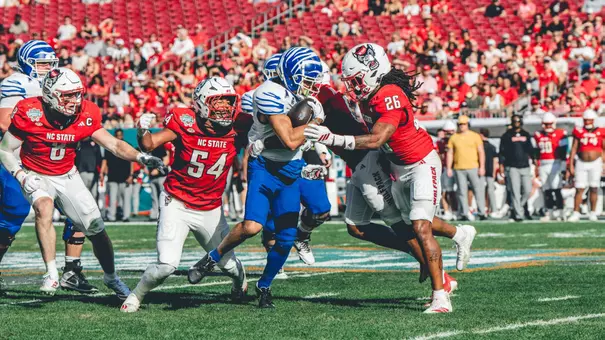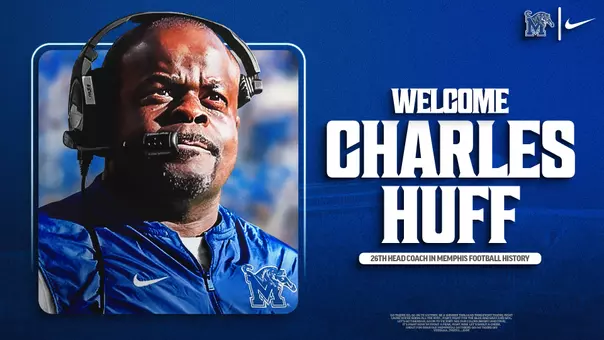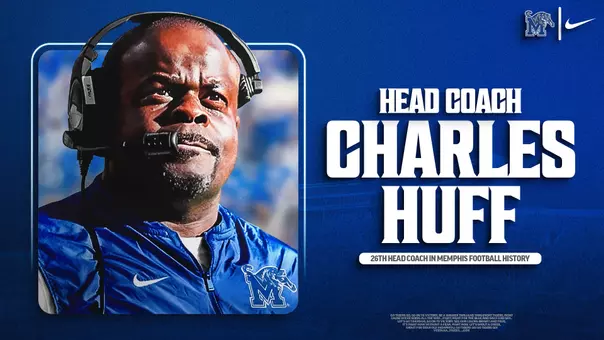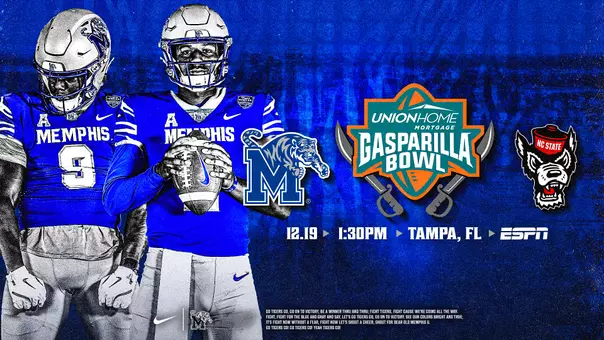University of Memphis Athletics
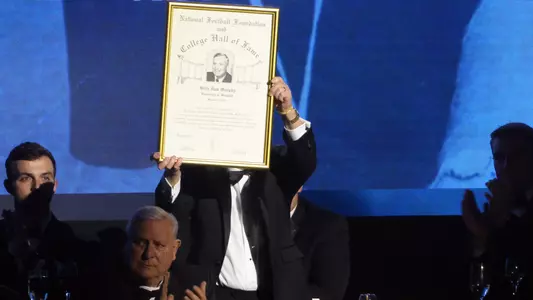
Billy J. Murphy Inducted into College Football Hall of Fame
Dec 07, 2022 | Football
MEMPHIS, Tenn. – Billy J. Murphy, the former head football coach and athletic director for the University of Memphis for more than 30 years, was posthumously inducted into the College Football Hall of Fame as part of the 2022 class at the 64th National Football Foundation (NFF) Annual Awards Dinner on Tuesday night in Las Vegas.
Murphy joins Allyn McKeen, the Memphis head coach from 1937-38, in the College Football Hall of Fame.
The 18 First Team All-America players and three standout coaches in the 2022 class were selected from the national ballot of 78 players and seven coaches from the Football Bowl Subdivision, the 99 players and 33 coaches from the divisional ranks and the NFF Veterans Committee candidates.
The inductees' accomplishments will be forever immortalized at the Chick-fil-A College Football Hall of Fame in Atlanta, and each inductee will receive a custom ring created by Jostens, the official and exclusive supplier of NFF rings.
The winningest coach in Memphis history, Murphy headed the Tigers' program for 14 years, posting winning records in all but two seasons and leading the school into the national rankings. Murphy passed away on February 21, 2008 at the age of 87.
In 1958, Murphy became head coach at Memphis, then-known as Memphis State, and he would take the program from obscurity to national prominence with multiple firsts while winning 67.3 percent of his games before his exit after the 1971 season with an overall record of 91-44-1. In 1960, he led the team's transition to major college status as a member of the NCAA University Division while posting an 8-2 record. As the Tigers' program grew in stature, Murphy replaced small-college opponents with major programs, including wins against Florida State, Houston, Miami (FL), Mississippi, Mississippi State, South Carolina, Virginia Tech and Wake Forest. In 1962, Murphy led the Tigers to their first win over a member of the SEC, a 28-7 victory at Mississippi State.
In 1963, the Tigers posted the school's first undefeated season since 1938 with a 9-0-1 record, and Murphy claimed National Coach of the Year honors from The Detroit Times while Memphis running back Dave Casinelli claimed the NCAA rushing title and the defense posted five shutouts. The team finished No. 14 in the UPI Coaches Poll, the highest ranking in school history. The lone tie that season, a 0-0 tilt, came against No. 2 Ole Miss, which had not been shut out in 47 games. In 1967, Murphy and the Tigers would finally gain the upper hand, claiming the program's first win against Ole Miss with a 27-17 victory at home.
In 1968, Memphis ended its 27-year run as an independent, joining the Missouri Valley Conference, and Murphy would earn Missouri Valley Conference Coach of the Year honors in three of the school's first four seasons in the conference. On Dec. 18, 1971, Murphy led Memphis to its first appearance and first win in a major bowl with a 28-9 victory over San Jose State in the Pasadena Bowl. The game marked Murphy's final appearance as a head coach, and he transitioned fulltime to athletics director, a role he had started in 1966 and held until 1981.
Murphy grew up in Siloam Springs, Arkansas, before enrolling at Mississippi State in 1939 and playing as an All-SEC tailback for future College Football Hall of Coach Allyn McKeen who had previously headed the Memphis program. In 1943 and the midst of World War II, Murphy joined the Marine Corps Reserve and transferred to Duke University for training with the V-12 Program. He served heroically in the South Pacific, narrowly escaping with his life on at least four occasions and receiving the Bronze Star, the Presidential Citation and the Navy Citation. Following World War II, Murphy returned to Mississippi State as the captain of the 1946 Bulldogs team.
After graduating from Mississippi State, Murphy took his first job as an assistant coach at Memphis for a five-year stint. In 1951, he returned to Mississippi State under head coach Murray Warmath who he then followed to Minnesota in 1954 for four seasons as the running backs coach before becoming the Memphis head coach at the age of 37 in 1958. Murphy has been inducted into the State of Tennessee Sports Hall of Fame, the Mississippi State Hall of Fame and the Memphis M Club Hall of Fame. Each year the Billy J. Murphy Award is presented to a former Memphis athlete who has excelled in their chosen profession after graduation, and the Tigers' practice facility is named in Murphy's honor.
Murphy, born January 13, 1921, was married to the late Elizabeth Parrish of Starkville, Miss., and the couple had two children, son Michael and daughter Libby.
How to follow the Tigers: For complete information on Memphis Tigers Football, visit www.GoTigersGo.com and follow the team's social media channels on Twitter, Instagram and Facebook.
Murphy joins Allyn McKeen, the Memphis head coach from 1937-38, in the College Football Hall of Fame.
The 18 First Team All-America players and three standout coaches in the 2022 class were selected from the national ballot of 78 players and seven coaches from the Football Bowl Subdivision, the 99 players and 33 coaches from the divisional ranks and the NFF Veterans Committee candidates.
The inductees' accomplishments will be forever immortalized at the Chick-fil-A College Football Hall of Fame in Atlanta, and each inductee will receive a custom ring created by Jostens, the official and exclusive supplier of NFF rings.
The winningest coach in Memphis history, Murphy headed the Tigers' program for 14 years, posting winning records in all but two seasons and leading the school into the national rankings. Murphy passed away on February 21, 2008 at the age of 87.
In 1958, Murphy became head coach at Memphis, then-known as Memphis State, and he would take the program from obscurity to national prominence with multiple firsts while winning 67.3 percent of his games before his exit after the 1971 season with an overall record of 91-44-1. In 1960, he led the team's transition to major college status as a member of the NCAA University Division while posting an 8-2 record. As the Tigers' program grew in stature, Murphy replaced small-college opponents with major programs, including wins against Florida State, Houston, Miami (FL), Mississippi, Mississippi State, South Carolina, Virginia Tech and Wake Forest. In 1962, Murphy led the Tigers to their first win over a member of the SEC, a 28-7 victory at Mississippi State.
In 1963, the Tigers posted the school's first undefeated season since 1938 with a 9-0-1 record, and Murphy claimed National Coach of the Year honors from The Detroit Times while Memphis running back Dave Casinelli claimed the NCAA rushing title and the defense posted five shutouts. The team finished No. 14 in the UPI Coaches Poll, the highest ranking in school history. The lone tie that season, a 0-0 tilt, came against No. 2 Ole Miss, which had not been shut out in 47 games. In 1967, Murphy and the Tigers would finally gain the upper hand, claiming the program's first win against Ole Miss with a 27-17 victory at home.
In 1968, Memphis ended its 27-year run as an independent, joining the Missouri Valley Conference, and Murphy would earn Missouri Valley Conference Coach of the Year honors in three of the school's first four seasons in the conference. On Dec. 18, 1971, Murphy led Memphis to its first appearance and first win in a major bowl with a 28-9 victory over San Jose State in the Pasadena Bowl. The game marked Murphy's final appearance as a head coach, and he transitioned fulltime to athletics director, a role he had started in 1966 and held until 1981.
Murphy grew up in Siloam Springs, Arkansas, before enrolling at Mississippi State in 1939 and playing as an All-SEC tailback for future College Football Hall of Coach Allyn McKeen who had previously headed the Memphis program. In 1943 and the midst of World War II, Murphy joined the Marine Corps Reserve and transferred to Duke University for training with the V-12 Program. He served heroically in the South Pacific, narrowly escaping with his life on at least four occasions and receiving the Bronze Star, the Presidential Citation and the Navy Citation. Following World War II, Murphy returned to Mississippi State as the captain of the 1946 Bulldogs team.
After graduating from Mississippi State, Murphy took his first job as an assistant coach at Memphis for a five-year stint. In 1951, he returned to Mississippi State under head coach Murray Warmath who he then followed to Minnesota in 1954 for four seasons as the running backs coach before becoming the Memphis head coach at the age of 37 in 1958. Murphy has been inducted into the State of Tennessee Sports Hall of Fame, the Mississippi State Hall of Fame and the Memphis M Club Hall of Fame. Each year the Billy J. Murphy Award is presented to a former Memphis athlete who has excelled in their chosen profession after graduation, and the Tigers' practice facility is named in Murphy's honor.
Murphy, born January 13, 1921, was married to the late Elizabeth Parrish of Starkville, Miss., and the couple had two children, son Michael and daughter Libby.
How to follow the Tigers: For complete information on Memphis Tigers Football, visit www.GoTigersGo.com and follow the team's social media channels on Twitter, Instagram and Facebook.
Football: 2025 Gasparilla Bowl Postgame Press Conference
Friday, December 19
Football: Reggie Howard Press Conference - December 16, 2025
Tuesday, December 16
Football: Jeff Brightwell One on One with Charles Huff-December 12, 2025
Friday, December 12
Football: Reggie Howard Press Conference-December 11, 2025
Thursday, December 11

